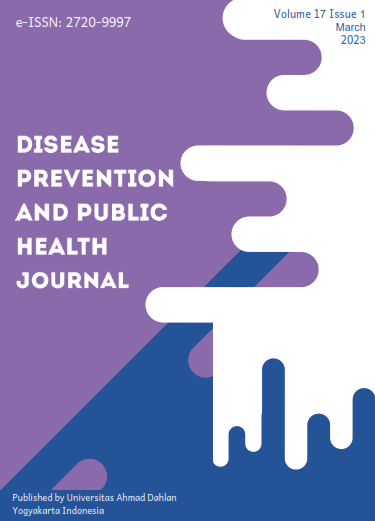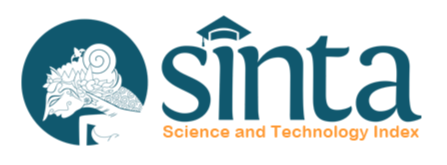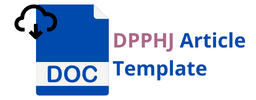Digital Health Literacy Competencies of Students in Faculty of Health Science
DOI:
https://doi.org/10.12928/dpphj.v17i1.6448Keywords:
Digital Health Literacy, Students, Faculty of Health ScienceAbstract
Background: Students are the most significant internet users in Indonesia. 49.52% of internet user groups in Indonesia are students. High internet users do not guarantee that digital health literacy is also high. Students at the Universitas Dian Nuswantoro health faculty are responsible for disseminating health information and transmitting digital health literacy interests. Health literacy skills are necessary for health students to sort out doubtful information. Good health literacy skills will impact students' ability to assess incoming data and make appropriate health decisions. This study aims to describe the digital health literacy skills possessed by students of the Faculty of Health. Universitas Dian Nuswantoro. Method: This descriptive study provides an overview/description of the digital health literacy skills possessed by students of the Faculty of Health. Universitas Dian Nuswantoro. The research population of health students is 1.642 people with the sample being 321 students. Data collection using Google Forms and distributed through class groups in WhatsApp (WA) and communicated privately. The statistical test used descriptive statistical analysis. Results: Faculty of Health Science at Universitas Dian Nuswantoro students had an "Advanced" or "Independent-Advanced" level of competence. The advanced level indicates that their digital competencies and health information skills are at their current status and without problems. Indicators that digital health literacy can improve our safety. Thus. students can improve methods for securing personal data. Conclusion: Digital health literacy is an ability needed in today's digital era. What needs to be improved is that students can choose the most appropriate method to protect personal data.
References
Cao W, Fang Z, Hou G, Han M, Xu X, Dong J, Zheng J. The Psychological Impact of the COVID-19 Epidemic on College Students in China. Psychiatry Res. 2020 May;287:112934. doi: 10.1016/j.psychres.2020.112934. Epub 2020 Mar 20. PMID: 32229390; PMCID: PMC7102633.
Rahimi-Ardabili H, Magrabi F, Coiera E. Digital Health for Climate Change Mitigation and Response: A Scoping Review. J Am Med Inform Assoc. 2022 Nov 14;29(12):2140-2152. doi: 10.1093/jamia/ocac134. PMID: 35960171; PMCID: PMC9667157.
Van Asbroeck S, van Boxtel MPJ, Steyaert J, Köhler S, Heger I, de Vugt M, Verhey F, Deckers K. Increasing Knowledge on Dementia Risk Reduction in the General Population: Results of A Public Awareness Campaign. Prev Med. 2021 Jun;147:106522. doi: 10.1016/j.ypmed.2021.106522. Epub 2021 Mar 17. PMID: 33744328.
Haikal H. Persepsi Masyarakat terhadap Hoax Bidang Kesehatan. J Manaj Inf dan Adm Kesehat. 2021;3(2). https://doi.org/10.32585/jmiak.v3i2.836
Haikal H, Pramitasari R, Yanuar AMF, Syifaâ N. The Behaviour of Health Faculty Students Responding to Hoaxes Related Covid-19 on Social Media. Dis Prev Public Heal J. 2021;15(2):64–70. https://doi.org/10.12928/dpphj.v15i2.3992
Law N. Woo D. de la Torre J. Wong G. A Global Framework of Reference on Digital Literacy Skills For Indicator 4.4. 2. UNESCO Inst Stat. 2018; https://doi.org/10.2139/ssrn.2781161
Nguyen A. Catalan-Matamoros D. Digital Mis/Disinformation and Public Engagment With Health And Science Controversies: Fresh Perspectives from Covid-19. Media Commun. 2020;8(2):323–8. https://doi.org/10.17645/mac.v8i2.3352
Matthijs Bakker M, Putrik P, Aaby A, Debussche X, Morrissey J, Borge CR. et al. Acting together-WHO National Health Literacy Demonstration Projects (NHLDPs) Address Health Literacy Needs in the European Region. 2019;(7):233–43. https://apps.who.int/iris/handle/10665/327059
Conard S. Best practices in digital health literacy. Int J Cardiol. 2019 Oct 1;292:277-279. doi: 10.1016/j.ijcard.2019.05.070. Epub 2019 Jun 5. PMID: 31230937.
Riiser K, Helseth S, Haraldstad K, Torbjørnsen A, Richardsen KR. Adolescents’ Health Literacy. Health Protective Measures. And Health-Related Quality of Life During the Covid-19 Pandemic. PLoS One. 2020;15(8):e0238161. Doi: https://doi.org/10.1371/journal.pone.0238161
Huybers T, Greene B, Rohr DH. Academic Research Integrity: Exploring Researchers' Perceptions of Responsibilities and Enablers. Account Res. 2020 Apr;27(3):146-177. doi: 10.1080/08989621.2020.1732824. Epub 2020 Mar 3. PMID: 32073893.
Gautam Y, Altaye M, Xie C, Mersha TB. AdmixPower: Statistical Power and Sample Size Estimation for Mapping Genetic Loci in Admixed Populations. Genetics. 2017 Nov;207(3):873-882. doi: 10.1534/genetics.117.300312. Epub 2017 Sep 26. PMID: 28951529; PMCID: PMC5676228.
Abramson EL, Paul CR, Petershack J, Serwint J, Fischel JE, Rocha M, Treitz M, McPhillips H, Lockspeiser T, Hicks P, Tewksbury L, Vasquez M, Tancredi DJ, Li ST. Conducting Quantitative Medical Education Research: From Design to Dissemination. Acad Pediatr. 2018 Mar;18(2):129-139. doi: 10.1016/j.acap.2017.10.008. Epub 2017 Nov 5. PMID: 29117573.
Haikal, H, Rachmani, E, Nugroho, B, Y, S, Iqbal, M, Nirmalasari, D, A, & Isworo S. Development of Digital Health Literacy Instruments for Students of the Faculty of Health Science. Universitas Dian Nuswantoro. J Sci Res Reports [Internet]. 2022;28(10):51–62. https://doi.org/10.9734/jsrr/2022/v28i1030557
Smith B, Magnani JW. New Technologies. New Disparities: The Intersection of Electronic Health and Digital Health Literacy. Int J Cardiol. 2019 Oct 1;292:280-282. doi: 10.1016/j.ijcard.2019.05.066. Epub 2019 May 28. PMID: 31171391; PMCID: PMC6660987.
Xie Y, An W, Zheng C, Zhao D, Wang H. Multidimensional Health Literacy Profiles and Health-Related Behaviors in the Elderly: A Cross-Sectional Survey. Int J Nurs Sci. 2022;9(2):203–10. https://doi.org/10.1016/j.ijnss.2022.02.007
Bak CK, Krammer JØ, Dadaczynski K, Orkan O, von Seelen J, Prinds C. et al. Digital Health Literacy and Information-Seeking Behavior Among University College Students During the COVID-19 Pandemic: A Cross-Sectional Study from Denmark. Int J Environ Res Public Health. 2022;19(6):3676. https://doi.org/10.3390/ijerph19063676
Clifford JS, Lu J, Blondino CT, Do EK, Prom-Wormley EC. The Association Between Health Literacy and Tobacco Use: Results from a Nationally Representative Survey. J Community Health. 2022;47(1):63–70. https://doi.org/10.1007/s10900-021-01019-7
Aldousari E, Al-Muomen N. Health Information-Seeking Behavior of Students at Kuwait University. Int Inf Libr Rev. 2022;53(4):315–32. https://doi.org/10.1080/10572317.2020.1849913
Dunn P, Hazzard E. Technology Approaches to Digital Health Literacy. Int J Cardiol. 2019 Oct 15;293:294-296. doi: 10.1016/j.ijcard.2019.06.039. Epub 2019 Jun 15. PMID: 31350037.
El Benny M, Kabakian-Khasholian T, El-Jardali F, Bardus M. Application of the eHealth Literacy Model in Digital Health Interventions: Scoping Review. J Med Internet Res. 2021 Jun 3;23(6):e23473. doi: 10.2196/23473. PMID: 34081023; PMCID: PMC8212628.
Noblin A, Gabriel MH, Cortelyou-Ward K, Holmes K. Health Literacy Among Visiting College Students in the US: A Pilot Study. J Am Coll Heal. 2022;70(2):589–97. https://doi.org/10.1080/07448481.2020.1758114
Chen Y, Y, Li C‐M, Liang J‐C, Tsai C‐C. Health Information Obtained from the Internet and Changes in Medical Decision Making: Questionnaire Development and Cross‐Sectional Survey. J Med Internet Res. 2018;20(2):e47. https://doi.org/10.2196/jmir.9370
Yang K, Hu Y, Qi H. Digital Health Literacy: Bibliometric Analysis. J Med Internet Res. 2022 Jul 6;24(7):e35816. doi: 10.2196/35816. PMID: 35793141; PMCID: PMC9301558.
Bittlingmayer UH, Dadaczynski K, Sahrai D, van den Broucke S, Okan O. Digitale Gesundheitskompetenz – Konzeptionelle Verortung. Erfassung und Förderung mit Fokus auf Kinder und Jugendliche [Digital health literacy-conceptual contextualization. measurement. and promotion]. Bundesgesundheitsblatt Gesundheitsforschung Gesundheitsschutz. 2020 Feb;63(2):176-184. German. doi: 10.1007/s00103-019-03087-6. PMID: 31950230.
Yoon J, Lee M, Ahn JS, Oh D, Shin SY, Chang YJ, Cho J. Development and Validation of Digital Health Technology Literacy Assessment Questionnaire. J Med Syst. 2022 Jan 24;46(2):13. doi: 10.1007/s10916-022-01800-8. PMID: 35072816; PMCID: PMC8784987.
van der Vaart R, Drossaert C. Development of the Digital Health Literacy Instrument: Measuring a Broad Spectrum of Health 1.0 and Health 2.0 Skills. J Med Internet Res. 2017 Jan 24;19(1):e27. doi: 10.2196/jmir.6709. PMID: 28119275; PMCID: PMC5358017.
Wang X, Luan W. Research Progress on Digital Health Literacy of Older Adults: A Scoping Review. Front Public Health. 2022 Aug 5;10:906089. doi: 10.3389/fpubh.2022.906089. PMID: 35991040; PMCID: PMC9389004.
Oh SS, Kim KA, Kim M, Oh J, Chu SH, Choi J. Measurement of Digital Literacy Among Older Adults: Systematic Review. J Med Internet Res. 2021 Feb 3;23(2):e26145. doi: 10.2196/26145.
Nutbeam D. From Health Education to Digital Health Literacy - Building on the Past to Shape the Future. Glob Health Promot. 2021 Dec;28(4):51-55. doi: 10.1177/17579759211044079. Epub 2021 Oct 31. PMID: 34719292.
Downloads
Published
Issue
Section
License
Copyright (c) 2023 Universitas Ahmad Dahlan

This work is licensed under a Creative Commons Attribution-ShareAlike 4.0 International License.
Authors transfer the copyright and grant the Disease Prevention and Public Health Journal right of first publication with the work simultaneously licensed under a Creative Commons Attribution License (CC BY-SA 4.0) that allows others to share (copy and redistribute the material in any medium or format) and adapt (remix, transform, and build upon the material) the work for any purpose, even commercially with an acknowledgement of the work's authorship and initial publication in Disease Prevention and Public Health Journal. Authors are able to enter into separate, additional contractual arrangements for the non-exclusive distribution of the journal's published version of the work (e.g., post it to an institutional repository or publish it in a book), with an acknowledgement of its initial publication in Disease Prevention and Public Health Journal. Authors are permitted and encouraged to post their work online (e.g., in institutional repositories or on their website) prior to and during the submission process, as it can lead to productive exchanges, as well as earlier and greater citation of published work (See The Effect of Open Access).

This work is licensed under a Creative Commons Attribution-ShareAlike 4.0 International License.







